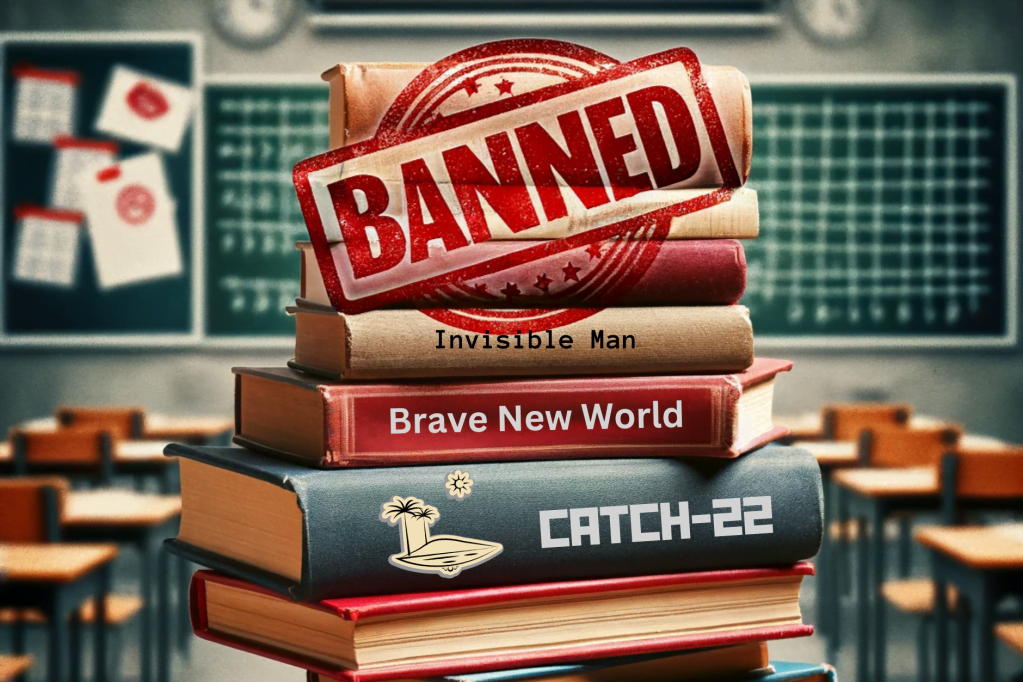Collier County, Florida, has taken the drastic step of banning over 300 books from its schools, including some of the most celebrated works in literature. This sweeping action comes in response to a new Florida censorship law aimed at removing sexual content from school curricula, leaving educators and free speech advocates deeply concerned about the future of education in the Sunshine State.

More than 300 books silenced in Florida
Among the casualties of this broad censorship effort are literary classics like “Invisible Man” by Ralph Ellison, “Catch-22” by Joseph Heller, and “Brave New World” by Aldous Huxley. These novels, once considered essential reading for students, are now deemed inappropriate under the shadow of Florida House Bill 1069. Additionally, contemporary young adult titles, such as “The Poet X” by Elizabeth Acevedo, “The Belles” by Dhonielle Clayton, “The Firekeeper’s Daughter” by Angeline Boulley, and “What Girls are Made Of” by Elana K. Arnold, have also been banned.
“Once again we see a Florida school district erring on the side of extreme caution while navigating vague legislation.”
Kasey Meehan, PEN American Freedom to Read Program Director
Kasey Meehan, the Freedom to Read program director at PEN America, expressed her dismay, stating, “We are saddened for the students of Collier County Public Schools that so many titles, including renowned literary classics and contemporary young adult works are banned from student access […] these books appear to be banned with little transparency and process. Once again we see a Florida school district erring on the side of extreme caution while navigating vague legislation.”
List of authors affected by book banning in Florida
The list of banned books is extensive and includes the works of many well-known and best-selling authors such as:
- Judy Blume
- Orson Scott Card
- Stephen Chbosky
- Mary Higgins Clark
- Arthur C. Clarke
- Pat Conroy
- Janet Evanovich
- Neil Gaiman
- John Green
- John Grisham
- Ellen Hopkins
- Khaled Hosseini
- Sue Monk Kidd
- Stephen King
- Barbara Kingsolver
- Dean Koontz
- David Levithan
- Patricia McCormick
- Toni Morrison
- Joyce Carol Oates
- James Patterson
- Ashley Hope Pérez
- Jodi Picoult
- Anna Quindlen
- Nora Roberts
- Tom Robbins
- Anne Rice
- John Updike
- Ibi Zoboi
Furthermore, a significant number of these banned titles have been adapted into popular movies and TV shows, further highlighting the impact of this decision on both literature and entertainment. Works such as “Dune Chronicles” by Frank Herbert, “One Flew Over the Cuckoo’s Nest” by Ken Kesey, “Girl with A Pearl Earring” by Tracy Chevalier, and “The Hate U Give” by Angie Thomas have all found success beyond the printed page.
Leading the charge against rising school book bans
PEN America, a leading advocate for free speech and the protection of literary works, has been closely monitoring and actively challenging the surge in school book bans across the United States. Florida has emerged as a hotspot for book banning, surpassing even Texas in the number of books restricted. To combat these restrictions on students’ access to literature, PEN America has filed a lawsuit against Escambia County, Florida.
Read: Florida school district ‘bans books with LGBTQ characters entirely’
It’s worth noting that the books targeted by these bans often include those authored by Black and LGBTQ+ writers and those that address themes of race, racism, and LGBTQ identities. This disturbing trend of book banning has escalated over the past year and a half, with PEN America recording over 5,800 book bans since the fall of 2021, marking a level of censorship unseen in decades.
As educators and advocates for free expression rally to defend the right to access diverse and thought-provoking literature, the battle over censorship in Florida’s schools continues to unfold. The impact of these bans reaches far beyond the borders of Collier County, raising critical questions about the future of education and intellectual freedom in the United States.